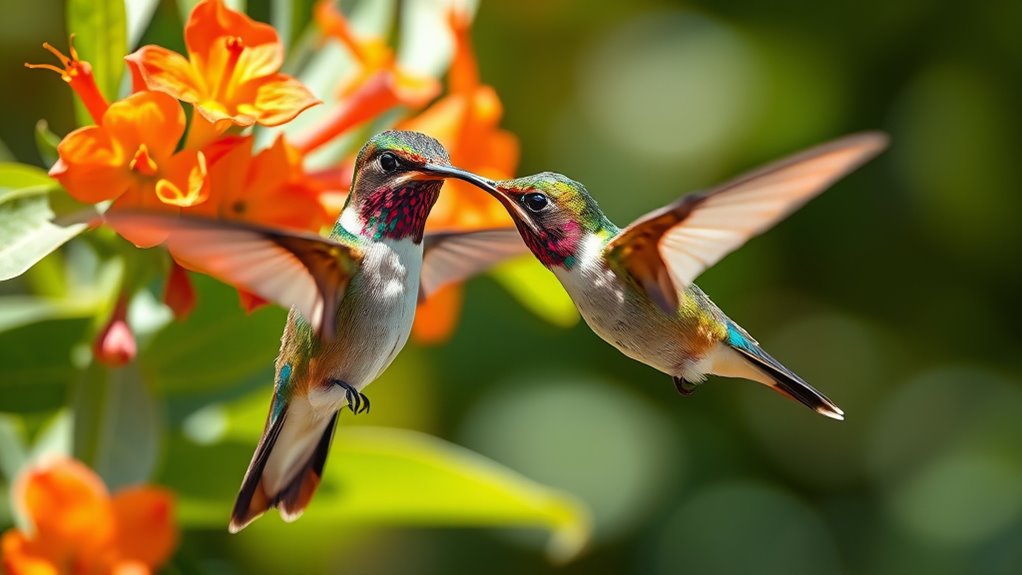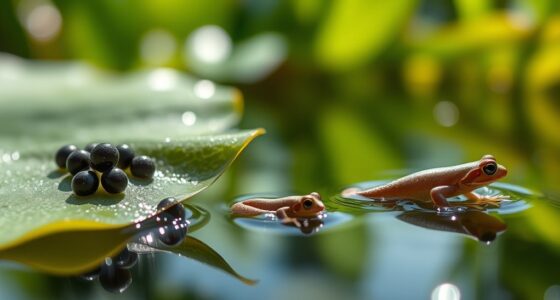Yes, birds can smell, and their olfactory abilities are more advanced than you might expect. Many species, like seabirds and vultures, use their sense of smell to locate food over long distances. Even songbirds rely on scent for navigation and social interactions, showcasing the importance of olfaction in their lives. These sensory capabilities enhance their survival and ecological roles. Discover how different bird species uniquely adapt their sensing abilities to thrive in varied environments.
Key Takeaways
- Yes, birds can smell, and many species rely on their olfactory abilities for survival and navigation.
- Seabirds, like albatrosses, can detect odors from miles away, aiding in locating food sources.
- Vultures have a highly developed sense of smell, enabling them to find carrion from great distances.
- Songbirds utilize smell for communication and navigation, identifying scents of mates and territories.
- Olfactory capabilities in birds vary by species, reflecting adaptive evolution and enhancing their ecological interactions.

Have you ever wondered how birds perceive their world? Their sensory capabilities are fascinating and often different from what you might expect. While many people think of birds primarily relying on their eyesight, which is indeed impressive, their sense of smell plays a significant role in how they interact with their environment. Birds have evolved various sensory adaptations that give them evolutionary advantages, allowing them to thrive in diverse habitats.
Recent studies have shown that many bird species possess a heightened sense of smell, challenging the long-held belief that birds primarily depend on their vision. For instance, seabirds like albatrosses can detect odors from miles away, which helps them locate food sources such as fish or carrion. This ability isn’t just a quirk; it provides them with essential survival skills in vast, open oceans where visual cues might be scarce. Imagine being able to smell a meal from afar; that’s a powerful tool for any bird.
Many birds, like albatrosses, possess a remarkable sense of smell, aiding their survival in vast oceans.
Additionally, certain species, like vultures, rely heavily on their olfactory senses to find carrion. They can detect the scent of decaying flesh from incredible distances, enabling them to locate food when it’s not visible. This reliance on smell gives them a distinct advantage over other scavengers that may not have such developed olfactory capabilities. It’s a prime example of how different sensory modalities can provide evolutionary advantages in the animal kingdom.
Moreover, songbirds also use their sense of smell for navigation and communication. For instance, some research suggests that they can identify the unique scents of their mates or their territories. This olfactory recognition helps them maintain social bonds and establish their presence in a particular area. In this way, their sense of smell is intertwined with their behavior and social structures, showcasing the complexity of avian life. Additionally, the presence of antioxidants in foods may play a role in enhancing birds’ overall health and olfactory capabilities.
Frequently Asked Questions
Do All Bird Species Have the Same Sense of Smell?
Not all bird species have the same sense of smell. Avian olfaction varies widely among species, with some, like vultures and kiwis, having excellent scent detection abilities. Others, such as many songbirds, rely more on their vision. You’ll find that adaptations to specific environments and diets influence how well birds can detect scents. So, while some birds excel in olfactory senses, others don’t rely on them as much.
How Do Birds Use Their Sense of Smell in the Wild?
Birds use their sense of smell for avian navigation and scent-based communication. You’ll notice species like the homing pigeon relying on scent cues to find their way home. They also use odors to locate food and identify mates, enhancing their survival. For instance, some seabirds can detect fish scents from miles away. By recognizing these scents, birds interact with their environment more effectively, showcasing the importance of smell in their daily lives.
Can Birds Detect Scents From Long Distances?
Yes, birds can detect scents from long distances, much like ancient sailors using the stars to navigate the sea. Their avian navigation relies on sophisticated scent detection mechanisms, allowing them to locate food, mates, and even nesting sites. Imagine a feathered explorer, following the invisible trails of fragrances carried by the wind, ensuring a successful journey. This remarkable ability highlights their adaptation and connection to the environment, showcasing nature’s incredible design.
Are There Specific Scents That Attract or Repel Birds?
Yes, there are specific scents that attract or repel birds. You can enhance bird scent detection by using fragrant bird feeders filled with seeds mixed with aromatic herbs or flowers. Scents like lavender and mint can draw in certain species, while strong odors, like vinegar, might keep them away. Experimenting with different scents in your bird feeders can help you discover what works best for attracting a variety of birds to your yard.
How Does a Bird’s Sense of Smell Compare to Mammals?
Birds’ sense of smell might not be as fantastic as a superhero’s, but it’s still pretty impressive! Unlike mammals, birds rely on their avian scent receptors and unique olfactory mechanisms to navigate their world. While many mammals have a stronger sense of smell, some birds, like vultures, can detect scents from miles away. So, when it comes to sniffing out food or mates, birds have their own tricks up their feathers!
Conclusion
In summary, yes, birds can smell, and their olfactory abilities might just surprise you! While they may not have noses like dogs, many species rely on their keen sense of smell to find food, navigate, and even recognize each other. So next time you watch a bird, remember, they’re not just relying on sight; their sense of smell is sharper than a hawk’s vision when it comes to survival. Nature’s wonders never cease to amaze!









